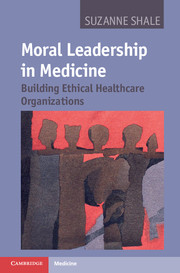Book contents
- Frontmatter
- Contents
- Preface
- Acknowledgements
- Chapter 1 Why medicine needs moral leaders
- Chapter 2 Creating an organizational narrative
- Chapter 3 Understanding normative expectations in medical moral leadership
- Prologue to Chapters 4 and 5
- Chapter 4 Expressing fiduciary, bureaucratic and collegial propriety
- Chapter 5 Expressing inquisitorial and restorative propriety
- Epilogue to Chapters 4 and 5
- Chapter 6 Understanding organizational moral narrative
- Chapter 7 Moral leadership for ethical organizations
- Appendix 1 How the research was done
- Appendix 2 Accountability for clinical performance: individuals and organizations
- Appendix 3 A brief guide to commonly used ethical frameworks
- Index
- References
Chapter 1 - Why medicine needs moral leaders
Published online by Cambridge University Press: 05 January 2012
- Frontmatter
- Contents
- Preface
- Acknowledgements
- Chapter 1 Why medicine needs moral leaders
- Chapter 2 Creating an organizational narrative
- Chapter 3 Understanding normative expectations in medical moral leadership
- Prologue to Chapters 4 and 5
- Chapter 4 Expressing fiduciary, bureaucratic and collegial propriety
- Chapter 5 Expressing inquisitorial and restorative propriety
- Epilogue to Chapters 4 and 5
- Chapter 6 Understanding organizational moral narrative
- Chapter 7 Moral leadership for ethical organizations
- Appendix 1 How the research was done
- Appendix 2 Accountability for clinical performance: individuals and organizations
- Appendix 3 A brief guide to commonly used ethical frameworks
- Index
- References
Summary
A certain day became a presence to me;
there it was, confronting me – a sky, air, light:
a being. And before it started to descend
from the height of noon, it leaned over
and struck my shoulder as if with
the flat of a sword, granting me
honor and a task. The day's blow
rang out, metallic or it was I, a bell awakened,
and what I heard was my whole self
saying and singing what it knew: I can.
By Denise Levertov, from Breathing the Water, copyright © 1987 by Denise Levertov. Reprinted by permission of New Direction Publishing Corp and Bloodaxe Books.
This book is about the moral challenges that confront medical leaders running the complex healthcare institutions on which we all rely. In the chapters to come I shall be discussing the issues that medical leaders have found to be morally troubling, what they have done to orchestrate an organizational response to their moral concerns, and the impact that leading healthcare organizations has upon them personally. In the course of my analysis of their experience I shall be suggesting a framework to conceptualize ethical action, discussing ways of understanding the ethics of healthcare organization, and proposing a new approach to developing ethical leadership.
Preventing or responding to medical harm, and associated worries about the capability or trustworthiness of colleagues, rank among medical leaders’ foremost moral concerns. In the case of medical harm they know that they have important moral work to do, but also that however well they do it they cannot change what has happened. It falls to medical leaders to patch things together in the aftermath, to repair something irrevocably broken, and to endeavour to prevent the same harm happening again. In the case of colleagues, medical leaders are troubled by how to prove suspected poor clinical performance, how to weigh evidence that is contradictory, and what to do about unverifiable allegations that doctors deny. They are concerned about doctors who act contrary to clinical protocols but apparently get good results, and about doctors who deliver a good service to individual patients but take so long or spend so much that other patients suffer. They worry that their judgement of colleagues might be based on grounds of prejudice, or in questionable cultural assumptions about how doctors should behave; they wonder whether they are siding with colleagues or failing to give them support, whether their standards are too low or too high and if they have ‘drawn the line’ in the right place. They sometimes take action knowing that colleagues are at risk of suicide, or aware of how colleagues’ families will pay the price for professional disrepute.
- Type
- Chapter
- Information
- Moral Leadership in MedicineBuilding Ethical Healthcare Organizations, pp. 1 - 32Publisher: Cambridge University PressPrint publication year: 2011



